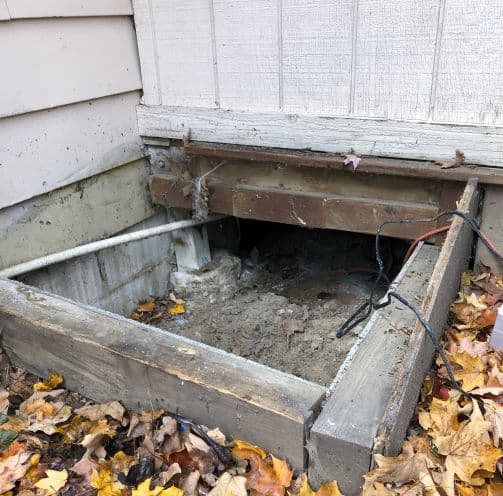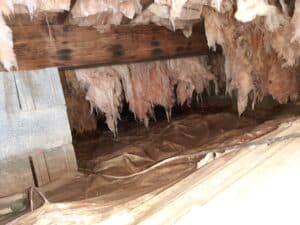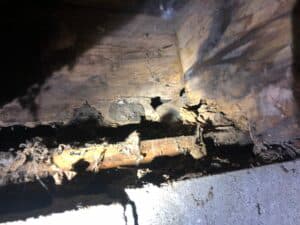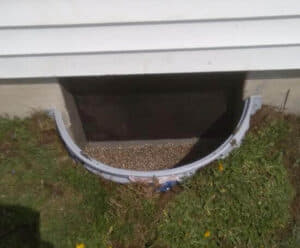
A door is an ages-old symbol of opportunity. We often reference this concept in our everyday language. We talk about getting one’s foot in the door, or how opportunity knocks at your door. There’s even an old adage alluding to this, “when one door closes, another door opens.”
This symbolism probably originates with the idea that a door is an access point; walking through a door means you’ve gained entry by invitation.
But not everything -or everyone- waits to be invited. And that’s where problems start.
At Acculevel, we specialize in foundation repair and waterproofing. Since opening our doors in 1996, we’ve been in over 25,000 crawl spaces. We are very familiar with the types of damage that occur in a crawl space, and how significant the impact can be on your entire home.
In this article, we’re going to discuss the importance of a secure door on your crawl space, and how this can affect your crawl space and its impact on your home.
This isn’t the set-up for a joke, and it’s not meant to be an obscure philosophical question. I just want you to think about it for a moment.
Your home’s front door serves a functional and structural purpose in your home. It’s a physical barrier, a form of protection. It blocks what is outside from getting inside.
It’s true that you don’t heat or cool a crawl space like your living spaces. But the temperature of the crawl space can affect the temperature in the building above it. That’s why you have insulation installed; it reduces how much of the chill from the ground seeps into your home.

This photo was taken by an Acculevel project advisor during an in-home assessment. The fiberglass insulation has gotten wet, and torn from the fasteners.
Now, if your floors are icy cold in the winter, your insulation is either missing, inadequate, or compromised. How effective can insulation be, if there’s an open gap in the foundation, right? The average crawl space entrance is between 2-3 feet square. That’s a hole large enough to let in plenty of air, and that air is often below freezing in the winter.
If you’ve had issues with frozen pipes in the past, this is another reason to invest in a solid door for your crawl space. Insulating water lines is helpful, but it’s a lot less effective if those pipes are exposed to bitterly cold winds. Remember it’s possible for water pipes to burst when they freeze; water expands as it becomes ice, creating pressure inside the pipe. Cleaning up after ruptured pipes is not fun or cheap.
On the other side of the coin, you’ll have a temperature problem in the summer, too. If your electric bill skyrockets when you run the air conditioner, but the air in your home still feels muggy? That’s another instance where the temperature (and humidity) of the outside air is tampering with your home’s comfort.
If you don’t have insulation in your crawl space, or the fiberglass insulation is falling down, you should check out our blog on replacing fiberglass with spray foam.
A solid, well-fitting door also stops the natural elements from intruding into your crawl space. It’s helpful to have your crawl space free of leaf litter and other debris that comes with windy days. These materials decompose over time, introducing mold spores into your home. But that’s not the only threat to your home’s well-being.
Your door will also block rain, snow, and other precipitation. Some of it may seep through cracks around the door- but a door will significantly reduce it. This is critical because water is extremely damaging to your home’s foundation. Erosion is a major source of uneven settling in a home.
Additionally, the number one cause of sagging floors is moisture. The wooden components of your floor (joists, beams, sill plate, etc) are all susceptible to water damage. In the picture above, we pointed out that fiberglass insulation had gotten wet. We need to be clear about this: you don’t have to have several feet of water in a crawl space before it becomes a problem.

This photo was also taken by an Acculevel project advisor during a free in-home assessment. These boards have gotten wet and rotted, causing significant slope in the floor.
Moisture and even high humidity can be enough to damage your home’s wooden structure. Wood can absorb moisture from the air. Even worse, so can fiberglass insulation. Since those two materials are in direct contact, that means when they get damp, they will often stay damp for extended periods of time. And fiberglass insulation can hold a serious amount of water before the weight of it pulls the insulation down.
Simply put, if you have a damp or humid crawl space, any fiberglass insulation you have will hold moisture next to your floor joists long enough to cause damage.
We value honesty and transparency, so we’ll be clear: a crawl space door is not as foolproof as a house door. This is because if something can burrow under your foundation, it can still get into your crawl space. Virtually all crawl spaces are built without a poured or constructed floor, so they’re open to the dirt below your house.
But there are many invasive pests that a secure door will keep out of your crawl space. The most common culprits are stray animals like cats and dogs, or wild animals like raccoons and skunks. And this sounds like paranoia, but it does happen: sometimes humans decide sleeping in your crawl space is better than being outdoors.
Something to keep in mind: your home’s floor doesn’t keep air from the crawl space from moving into your home. In fact, depending on which study you read, up to 50% of your home’s air comes from the crawl space. So you are going to breathe whatever is down there, at least to some extent.

This photo was taken by an Acculevel team member, after installing a steel door and window well in a customer’s crawl space.
When you have unwanted guests that introduce germs and bacteria into your home? You and your family are going to breathe some of that into your own lungs.
We also can’t overlook the physical damage intruders can do to the items in your crawl space. Many animals will use fiberglass insulation for bedding. Rodents often chew on wires or cables, and larger animals damage ductwork or pipes by trying to make room for themselves. (This is usually because hot water pipes and ductwork are sources of additional heat.)
Acculevel offers two different types of crawl space doors: insulated steel doors and Turtls. The linked article will take you to our comparison of the two, so you can decide which one is best for you.
If you have more questions about crawl spaces and repairs, we also have a detailed guide for homeowners. This is a free resource that explores sagging floor repairs, mold remediation, waterproofing, insulation, costs, and repair methods.
If you live in Indiana or in portions of the surrounding states, call Acculevel. (If you’re not sure? Check our interactive service map.)
We’ll schedule an in-home appointment for you with one of our knowledgeable and experienced project advisors. They will review your concerns, any symptoms you’ve noticed, and what your goals are for your home. Your project advisor will then assess your entire home, review their findings with you, and explore the options available. As a team, you’ll decide on the best whole-home solution for you and your home.
Do you prefer written communication? Have questions for our staff? Our online contact form is right here.
If you don’t live within our service area, please make sure the contractor you hire is properly insured and accredited by the Better Business Bureau. We also have a free checklist of questions to ask a contractor, which can help you screen potential companies for the right one for you.
[DISPLAY_ULTIMATE_SOCIAL_ICONS]